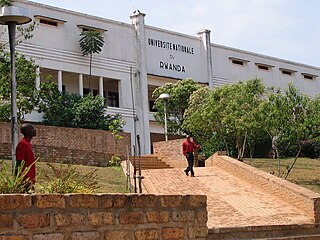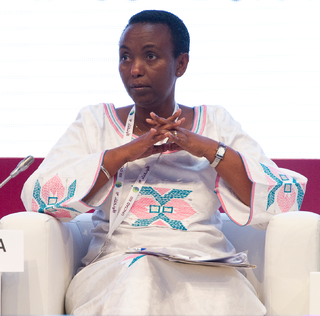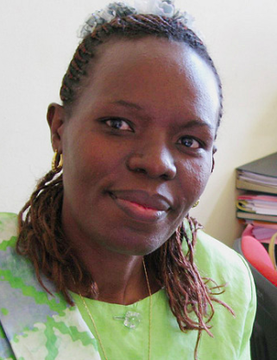Related Research Articles

Rwanda, officially the Republic of Rwanda, is a landlocked country in the Great Rift Valley of East Africa, where the African Great Lakes region and Southeast Africa converge. Located a few degrees south of the Equator, Rwanda is bordered by Uganda, Tanzania, Burundi, and the Democratic Republic of the Congo. It is highly elevated, giving it the sobriquet "land of a thousand hills", with its geography dominated by mountains in the west and savanna to the southeast, with numerous lakes throughout the country. The climate is temperate to subtropical, with two rainy seasons and two dry seasons each year. It is the most densely populated mainland African country; among countries larger than 10,000 km2, it is the fifth-most densely populated country in the world. Its capital and largest city is Kigali.

Rwanda is a de facto one-party state ruled by the Rwandan Patriotic Front and its leader Paul Kagame since the end of the 1994 genocide against members of the Tutsi ethnic group. Although Rwanda is nominally democratic, elections are manipulated in various ways, which include banning opposition parties, arresting or assassinating critics, and electoral fraud.

Juvénal Habyarimana was a Rwandan politician and military officer who was the second president of Rwanda, from 1973 until his assassination in 1994. He was nicknamed Kinani, a Kinyarwanda word meaning "invincible".

The Rwandan genocide, also known as the genocide against the Tutsi, occurred from 7 April to 19 July 1994 during the Rwandan Civil War. Over a span of around 100 days, members of the Tutsi ethnic group, as well as some moderate Hutu and Twa, were systematically killed by Hutu militias. While the Rwandan Constitution states that over 1 million people were killed, most scholarly estimates suggest between 500,000 and 662,000 Tutsi died. The genocide was marked by extreme violence, with victims often murdered by neighbors, and widespread sexual violence, with between 250,000 and 500,000 women raped.
Agathe Uwilingiyimana, sometimes known as Madame Agathe, was a Rwandan political figure. She served as Prime Minister of Rwanda from 18 July 1993 until her assassination on 7 April 1994, during the opening stages of the Rwandan genocide. She was also Rwanda's acting head of state in the hours leading up to her death.

The National University of Rwanda was the largest university in Rwanda. It was located at 2°36′58″S29°44′34″E in the city of Butare and was established in 1963 by the government in cooperation with the Congregation of the Dominicans from the Province of Quebec, Canada. Its founder and first rector was Father Georges-Henri Lévesque.

Louise Mushikiwabo is the fourth and current Secretary General of the Organisation internationale de la Francophonie. She previously served as the Minister of Foreign Affairs and Cooperation of Rwanda from 2009 to 2018. She also served as Government Spokesperson. She had previously been Minister of Information.

Uriel Lubrani was an Israeli diplomat and military official. In 1964, he joined the diplomatic corps of the Foreign Ministry, and was appointed ambassador to Uganda and non-resident ambassador to Burundi and Rwanda, serving until 1967. From 1967 to 1971, he was ambassador to Ethiopia. From 1973 to 1978, he was ambassador to the Imperial State of Iran.

The Rwanda women's national football team represents Rwanda in women's association football and is controlled by the Rwandese Association Football Federation. It had to date been scheduled to compete in one major tournament, the inaugural Women's Challenge Cup held in Zanzibar in October 2007, but the event was ultimately canceled. It has finally debuted in February 2014 against Kenya. The team is nicknamed The She-Amavubi.

The Supreme Court of Rwanda is the highest court of Rwanda, as defined by Article 143 of the 2003 Constitution of Rwanda. Article 144 of the Constitution determines that the Supreme Court is the highest jurisdiction in the country. Article 145 empowers the Supreme Court to coordinate and oversee the activities of the lower courts and tribunals, while ensuring judicial independence.
During the Rwandan genocide of 1994, over the course of 100 days, up to half a million women and children were raped, sexually mutilated, or murdered. The International Criminal Tribunal for Rwanda (ICTR) handed down the first conviction for the use of rape as a weapon of war during the civil conflict, and, because the intent of the mass violence against Rwandan women and children was to destroy, in whole or in part, a particular ethnic group, it was the first time that mass rape during wartime was found to be an act of genocidal rape.

Aloisea Inyumba was a Rwandan politician, who was the country's Minister for Gender and Family Promotion and as executive secretary of the National Unity and Reconciliation Commission.

Joy Mukanyange is a Rwandan diplomat and activist. She has served as an ambassador to Tanzania and later to Kenya.

Judith Kanakuze was a Rwandan politician and women's rights activist best known for passing legislation against gender-based violence, including Rwanda's first legal definition of rape, and contributing constitutional gender quotas that required women's representation in governmental bodies. She worked in multiple fields, including nutrition and civil service, before becoming a prominent leader of women after the 1994 Rwandan genocide, in which she lost most of her extended family. Kanakuze founded the early women's organization Réseau des Femmes and represented women's interests at the Arusha Accords and on Rwanda's committee to establish a constitution. The gender quotas that required women to compose at least 30 percent of governmental bodies subsequently quickly spurred women's participation to exceed the quotas in parliament. She was elected to Parliament in 2003 and reelected in 2008. During her terms, she presided over the Rwanda Women Parliamentary Forum.
Speciose Ayinkamiye is a Rwandan politician, currently a member of the Chamber of Deputies in the Parliament of Rwanda.
Angèle Mukakayange was a Rwandan politician. She was the first woman to be elected as a member of parliament in Rwanda.

The Definitive Constitution of the Kingdom of Burundi, sometimes called the "independence constitution", was the constitution of the independent Kingdom of Burundi from its promulgation in 1962 until its suspension in 1966.
Aloysie Cyanzayire is a lawyer, judge, public servant, and former president of the Supreme Court of Rwanda, currently serving her second term as Supreme Court justice. She is the first female president of the Supreme Court in Rwanda’s history.
References
- ↑ Swanee Hunt (2017). Rwandan Women Rising. Duke University Press. p. 77. ISBN 978-0-8223-7356-8.
- ↑ François-Xavier Munyarugerero (2003). Réseaux, pouvoirs, oppositions: la compétition politique au Rwanda. L'Harmattan. pp. 103–4. ISBN 978-2-7475-3610-3.
- ↑ Jean-Marie Kamatali; Josephine Dawuni; Gretchen Bauer (2015). "Rwanda: Balancing Gender Quotas and an Independent Judiciary". Gender and the Judiciary in Africa: From Obscurity to Parity?. Taylor & Francis. p. 203. ISBN 978-1-317-51648-4.